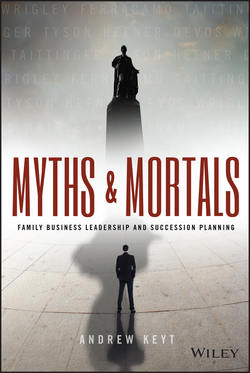Читать книгу Myths and Mortals - Keyt Andrew - Страница 7
На сайте Литреса книга снята с продажи.
Prologue: Born in the Shadows
Born in the Shadows
ОглавлениеThis scenario plays out in different ways for people like Bill, children of powerful parents who are called to lead successful family businesses into the next era. These children are born into a story already being told about their parents, their families, and businesses. Larger than life, the stories of heroism, history, and success seem impossible to replicate. Historically, family businesses have been the backbone of our economy and our communities, and the stories of the founder and the family have grown with each succession. Family businesses, however, are more than lore; they are the natural unit of our economic enterprise. They take greater ownership and responsibility for the long-term well-being of their businesses, through stewardship of both their financial assets and investing in their employees, and their communities.1
I believe that family businesses can continue to solidify our economies into the future. But the challenge is great. Huge corporations dominate the economic landscape. Many of these are relatively new, responsive organizations that started small but grew to rule the market (like Amazon and Google). We laud entrepreneurs who build these companies, and often overlook those who have built strong and stable organizations across generations. Building a strong business is one challenge; building an organization that can sustain both a family and a business that benefits family, employees, and the community across generations is an entirely different challenge.
The individuals at the center of these legacy companies are family business successors. These successors have the herculean task of trying to establish their own identities, passions, and beliefs, and develop their own leadership styles while dealing with the expectations and shadows of their parents', grandparents', and great grandparents' success.
My 20 years working with family business owners and teaching successors in the Next Generation Leadership Institute at Loyola University Chicago's Quinlan School of Business and through Next Generation activities with the Family Business Network confirms the struggle of a successor to emerge from the shadows cast by these stories. In one sense, the stories help successors make sense of their relationship with their parents and their family history. They can inspire the successor to think big. But too often in the telling of these stories, the parents' failures and vulnerabilities become appendices to the larger narrative, or are lost altogether in the repeated recounting of their heroics. If a parent is building an empire, a child reasons, the stories explain their parents' absence and why they always felt like a runner-up in the pick of priorities. The stories create myths of the predecessor, encouraging the idea that the successor must lead without vulnerability or failure, and that success comes from an almost magical quality that their parent possesses. This prompts the next generation to excessively emulate their parents and to avoid failure at all costs. What confidence a successor may possess can be crushed by the monolithic message, “You'll never be as good as your dad.”
1
D. Miller and I. LeBreton-Miller, Managing for the Long Run (Boston: Harvard Business School Press, 2005) p.18–31.
